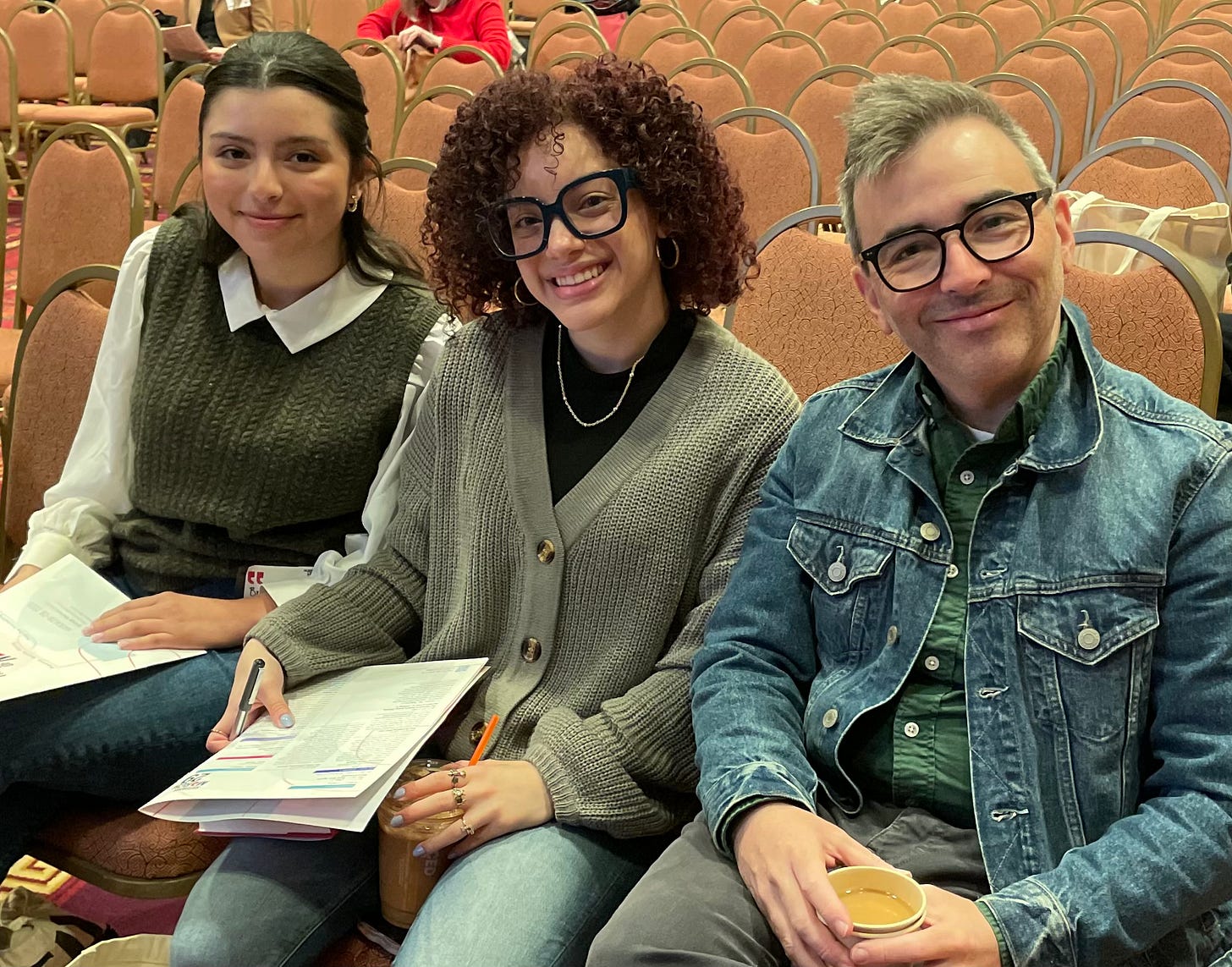Narrative Power!
Reflections on the 2025 Power of Narrative Conference at Boston University

In a packed auditorium on Boston University’s campus, renowned journalist Connie Chung recounted her early days as one of the few women — and even fewer women of color — covering national news. Against a backdrop of photos of her younger self, she didn’t hold back. She encountered some tough opposition to her rise in American media, she told the audience of writers, journalists, editors, scholars, and students as she dispensed criticism and advice in equal measure — all tinged by her sharp wit.
Chung was the closing keynote speaker for this year’s Power of Narrative (PON) Conference, capping off two days of lectures, panels, and workshops on March 28 and 29. I had the privilege of attending with three of my fellow faculty members, Brooke Delp, Scott Nowka, and Tanya Rodrigue, and four students, Briana Alvarez, Johellytz Aviles, Simon Carder, and Devosha Pearce. I’ve long wanted to attend the annual conference, known for attracting prestigious writers, and it did not disappoint.
While there were many highlights over the two days, if I’m honest, the best part for me was the time spent with colleagues and students, learning together, debriefing after a session, or sharing a meal. I reached out to a few of my fellow attendees to hear about their highlights, and you can read them below.
Briana Alvarez ‘25
As I get closer to my last semester of not just Salem State but my undergrad, I’ve realized that the real world doesn’t just start when I graduate. The world hasn’t been put on pause until it’s my turn to start, that play button has been pushed for a long time. I didn’t register how excited I was for the conference until I got there. I leaned against the brick wall in the back of the large room and listened to Connie Shultz and I already couldn’t wait for the next day. I wrote things in my little notebook and looked in awe at the speakers. It occurred to me that although it’s scary that the world is happening without me, I am perfectly capable of pushing through the crowd to get to the center.
The way I looked at my tiny notebook days ago compared to now is completely different. There are pages in there that are filled with words of wisdom, direct quotes that made my mind explode, and also strategies to help me better my art. Throughout the conference, many of the speakers emphasized the importance of supporting the next wave of journalists and writers. Hearing that made me feel like I didn’t have to push through people as much as I imagined, and hopefully, they’ll give me the room to walk.
Johellytz Aviles ‘25
Simply put, attending the Power of Narrative conference at Boston University was an amazing opportunity that I’ll be bragging about for the rest of my life. We were in a building full of journalists who were imparting firsthand wisdom that some of us probably wouldn’t be able to get otherwise. The reassurance by several of the speakers that we belong in those spaces and that our voices deserve to be heard will stay with me through my moments of doubt. Even if I don’t pursue journalism, I still got a lot of information out of it and loved the entire experience!
Scott Nowka, Professor & Chair, English department
As a literature professor, I was a fish out of water at the conference. As a result, I learned a lot. Many of the panels that I attended dealt with the ethical concerns of working with people — interviewing a Filipino hitman that lead one of President Duterte's death squads, or a woman accused of murdering her mother-in-law with a fireplace poker, or the hero of a nightclub mass shooting dealing with trauma from the event.
What can you ask? Can you sympathize? Can you become friends? These were all questions that I have never had to ask, as the authors I study are all comfortably dead. But I also learned how you connect with people and get them to answer uncomfortable questions. I was shocked, in fact, to learn that the interview technique used by the fictional detective Cordelia Cupp of the Netflix series The Residence actually works. If you are not familiar with this eccentric, bird-watching detective, she does not ask interview questions. She just stares at her subjects until they wither and break, admitting things that they never would have shared if asked. While it makes great television, I never thought that this would work in a real interview. But Hannah Beech, the New York Times Senior Asia correspondent, said she had watched an unnamed (but very well known) male journalist stare down that Filipino hitman I mentioned until he spilled the beans and opened up about his crimes.
This year, we were able to attend the Power of Narrative Conference thanks to a Strategic Plan Grant awarded to the English department for the purposes of the reinvigorating the Professional Writing concentration. Needless to say, we’ll be looking for ways to make this an annual opportunity for faculty and students alike.



